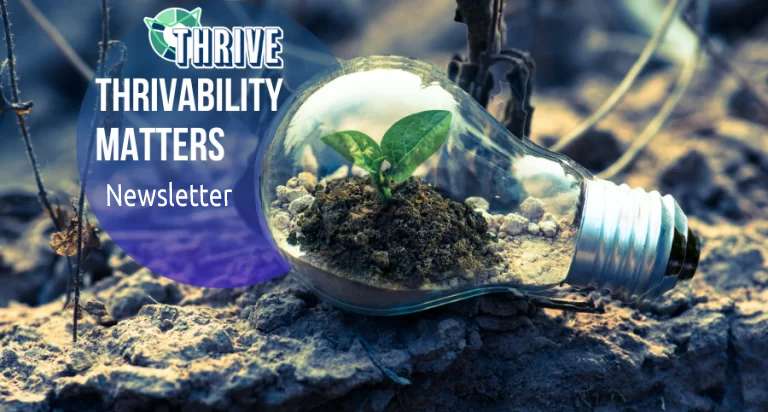thrivability matters Newsletter
Get the inside scoop!
The Thrivability Matters Newsletter (TMN) is your front-row seat to everything happening in our community. From the latest groundbreaking articles to inspiring volunteer achievements and exciting webinar highlights, we have you covered! Stay in the loop with all things THRIVE and discover how we’re working to create a future beyond sustainability.
Ready to take the first step toward a more positive impact on our planet? Sign up now and be part of the movement to transform our world into a thriving haven for all.
Latest newsletter
-

THRIVABILITY MATTERS NEWSLETTER | MARCH 2025
Metrics: Health & Well-being: SDG3Ever wondered how we can build a healthier future? It begins with tracking the right things—because what we measure, we can improve, from our health to our overall well-being.
Subscribe
-

THRIVABILITY MATTERS NEWSLETTER |NOVEMBER 2022
CLEAN & AFFORDABLE ENERGY: SDG7Investing in our future through clean and affordable energy needs to happen now! Renewable energy sources cannot be considered a backup when we are running out of resources at an unsustainable rate. Human-caused greenhouse gas emissions are primarily driven by the energy sector, which accounts for three-quarters of the emissions. A dirty diet is becoming more popular in some countries due to geopolitical circumstances. -

THRIVABILITY MATTERS NEWSLETTER |OCTOBER 2022
The proportion of population below the international poverty line is increasing, with an estimated 9% of the global population living in extreme poverty (living on less than 1.90$ a day). Moreover, new research published by the UNU World Institute for Development Economics Research warns that the economic fallout from the global pandemic could increase global poverty by as much as half a billion people, or 8% of the total human population. -

THRIVABILITY MATTERS NEWSLETTER |SEPTEMBER 2022
SUSTAINABLE CITIES AND COMMUNITES: SDG11As the world is becoming increasingly urbanised, with over half of the population living in cities, new urban development plans are needed. These urban developments need to be sustainably planned, as we are already lending natural space that is needed for the earth to THRIVE. Mass deforestation and draining lakes and rivers have allowed us to build megacities and wonderful buildings, but at what costs? -

THRIVABILITY MATTERS NEWSLETTER |AUGUST 2022
LIFE BELOW WATER & LIFE ON LAND: SDG14 & SDG15This month THRIVE focuses on SDG 14 and 15 i.e. sustainable use and conservation of oceans, seas and resources of marine life as well as terrestrial ecosystem. As a matter of fact, life on the planet is supported by the ocean that also helps in regulating the global climate system. However, levels of ocean degradation are increasing – by 2050, it is expected there will be more plastic in the ocean than fish and by 2100, a 100–150% rise in acidity will affect half of all marine life. SDG 15 seeks to protect, restore and promote sustainable use of our terrestrial ecosystem. -

THRIVABILITY MATTERS NEWSLETTER |JULY 2022
INDUSTRY, INNOVATION, AND INFRASTRUCTURE: SDG9This month we’ve focused on industry, innovation, and infrastructure. Achieving socially inclusive and environmentally sustainable economic development is vital if we want a prosperous future for humanity. Building partnerships, investing in infrastructure, and fostering innovation are essential to solving our economic and environmental challenges. If all that sounds a little beyond your control we’ve also had a lot to say about sustainability at home. -

THRIVABILITY MATTERS NEWSLETTER |JUNE 2022
CLEAN WATER AND SANITATION: SDG6This month, THRIVE focused on Clean Water and Sanitation. Currently, clean water, flushing toilets and other forms of sewage treatments are the biggest concerns among many, affecting the health of millions all over the world. According to WHO and UNICEF, 900 million or one in eight people in the world do not have access to clean drinking water. The quality of life especially in developing nations is impacted due to poor hygiene conditions and unclean water. However, people in developed nations are equally suffering.

















